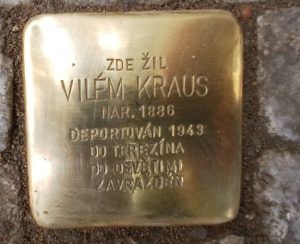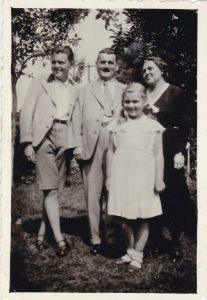 Address: PAŘÍŽSKÁ 127/20, PRAGUE 1
Address: PAŘÍŽSKÁ 127/20, PRAGUE 1
Born 18. 02. 1886
Last residence before deportation: Prague V
Address/place of registration in the Protectorate: Prague V, Norimberská 20
Transport Cw, no. 75 (09. 03. 1943, Prague -> Terezín)
Transport Dl, no. 120 (06. 09. 1943, Terezín -> Auschwitz)
Murdered
Foto from left:
Pavel Kraus, Vilém Kraus, Edita Krausová, Marie Krausová, cca 1937
Vilém Kraus was born as the fifth and last child of Augusta and Josef Kraus in Radějovice, a village southeast of Prague, on February 18, 1886. His mother Augusta came from the Kolben family of businesspeople, while his father Josef was born in the village of Zdebuzeves in the Sázava region.
Vilém attended elementary school for four years and then began working as a representative for several leather companies. During World War I, he served in the Habsburg army on the Eastern Front. In July 1922, he married Marie Lišková, who was twelve years younger and Gentile; she converted to Judaism. The following year, their son Pavel was born. Then, in 1927, their daughter Edita was born. The Kraus family was doing well. They had a nice apartment on Bílkova Street and a housekeeper, Marie Brožková, who lived with them. At home, they spoke Czech and the children attended high school. Shortly before the occupation, the family moved to Pařížská 20.
After the Munich agreement, Vilém’s sister Adéla Löwyová was the only one who managed to emigrate to Britain, to Leicester. All of Kraus’s other siblings perished in the Holocaust: Hermína Glückaufová in January 1942 to Terezín and in April to Izbica. Rudolf in May 1942 to Terezín and two days later to Lublin. Olga Roubitschková was sent to Terezín in June 1942, where she died of pneumonia two months later.
Vilém’s warehouse was “aryanized” a few days after the occupation. He then worked as a travelling salesman with bijouterie jewelry. In August 1942, Marie took her own life. Six months later, in March 1943, Vilém was deported to Terezín. He worked there as an administrator at the Zentrale Bekleidungsreparaturwerkstätte and lived in the Hanover Barracks. He suffered from a chronic cough as he had all his life. He corresponded with his children and was protected from the worst hunger by parcels from Marie Brožková. In September 1943, Vilém was assigned to a transport to Auschwitz Birkenau, to the Terezín Family Camp BIIb. From there, his children and Marie Brožková received one more postcard, in which he sent greetings to the Brode family – a coded request for food. He probably did not live to see the mass murder on March 8, 1944, when all the still living people from the September transport were sent to their deaths by gas. Like a quarter of its members, he had already perished from the inhumane conditions at Birkenau. He did not live to be 58 years old.
